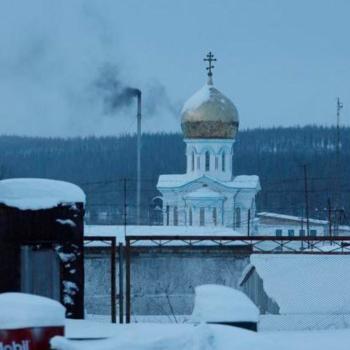
The following letter is by Dan Culbertson and used by permission
“Many people have been asking us how ordinary Russians are responding to the situation in Ukraine and the resulting sanctions. While there are lots of different responses across the whole spectrum from active protest to denial and apathy, the response that strikes me as being most uniquely Russian is fatalism.
As a foreigner who has lived in Russia for 15 years, I have been heavily influenced by parts of Russian culture. The example that sticks out most to me is that, in Russia, you would never ever sit with a group of friends, open up a snack or a chocolate bar and proceed to eat it all yourself. In Russia, you open your snack, or snap the chocolate bar into small squares and place it in the middle of the table for everyone to share. Certainly, that’s a better way of snacking (and making friends) than my American style.
But there are some things about Russian culture that I just cannot understand. Fatalism has never been more conspicuously prominent than during this “special military operation” in Ukraine. From students to grandmothers, there is a sense that what is going to happen is going to happen and there is nothing an ordinary person can do except endure it. This belief in fate is not just a wartime reaction, but a very common response to questions about the nature of God that I’ve heard countless times from Moscow students.
Of course, this response is nothing new in the history of Russia and the causes of it can be clearly seen in a turbulent history which has been punctuated by periods of suffering which, at a basic level, just need to be endured. But all of this has contributed to a general passivity.
This stoic acceptance of harsh realities seems to be mostly unaffected by the message of Christianity. Many Ukrainian Christians are demanding more than just words and prayers for peace from their Russian brothers and sisters. Group chats of pastors on telegram, church meetings, and social media pages have grown into vicious fights between these two camps: “Do something more than just pray” and “We don’t want to take sides, just ask God for peace.”
Social media posts are being actively shared in Russian evangelical circles from Ukrainians apologizing for the harsh demands and tone of messages from more militant Ukrainians who indict Russian believers as complicit through their silence. In one post, a Ukrainian man says that the world has been turned upside down for everyone and that the only thing to do is to recognize what God says through the prophet Isaiah “My thoughts are not your thoughts, neither are your ways my ways” (Is 55:8). What can we do in such a situation other than just recognize that God is doing something we cannot understand? Fighting against the current reality becomes the same thing as fighting against the will of God: “Things are like this because that’s how God wants them to be.”
Change in Russia comes about not by the efforts of ordinary people, but, as one Russian friend recently wrote “…in the past and now there was the expectation of Russian people that some strong, smart leader will come and fix everything.” The President will fix it. The US or the EU will solve it. Ukraine will decide it. She continues, “In the meantime, many more innocent people will be killed, infrastructure destroyed, etc.”
American optimism is not the key to world peace. Seen across the world as hopelessly naive, on one hand, and viciously hypocritical on the other, American idealism lacks the power to bring about real change.
So, if Russian culture is fatalistic and American culture is overconfident in its own ability to solve problems (our own and the world’s), where do we go at times of crisis, when glib optimism and dark fatalism fail us?
The prophet Daniel, an exile working for the government of the occupying empire, prayed to God in sackcloth and ashes, confessing the sin of his people on their behalf. He demanded that God act according to His promises. “O Lord, hear; O Lord, forgive; O Lord, listen and act and do not delay! For your own sake, O my God, because your city and your people bear your name!” (Dan 9:19 NRSV).
Abraham pleaded with God to not destroy Sodom (Gen 18). Moses was willing to give himself up rather than allow God to destroy His people (Ex. 32). The heroes of faith in the Old Testament were not commended because of their passivity.
NB: don’t miss a special episode of the Determinetruth podcast this Friday, Mar 18 as we interview Christians from Russia and get a glimpse into their lives in the midst of the war and how we can support our brothers and sisters in Ukraine and Russia.
There is nothing either fatalistic or optimistically self-dependent in the ministry of Jesus Christ. He was clear-eyed when it came to the evil he was up against but he was never frozen into passivity. He trusted God and stood up to the powers and principalities wherever he found them: In sickness, injustice, demon-possession, self-righteousness, and even in the political aspirations of both zealots and Romans.
Jesus’ prayer in the garden “yet, not my will but yours be done” (Lk 22:42) is the exact opposite of passive fatalism disguised as faith. Neither is it a conviction that he himself can solve the world’s problems. Giving up our own will to the Father is an active, radical movement towards God’s vision of how the world ought to be.
If we follow Jesus, we do not have the option of sacrificing at the altar of fate. We do not get to pray without the expectation of God working mightily. After we pray the words, “Your will be done on earth as in heaven,” we are commissioned and sent out to be Christ’s body in the world, his radical, peace-making presence. But we remember that one day God will make all things new. We pray, along with John on Patmos, “Amen. Come, Lord Jesus!” (Rev 22:20).
Thanks Dan, for letting us see your thoughts! And may we all pray for peace with a hopeful expectation that God will hear our prayers.
Dan Culberson spent 15 years working with a Christian Student organization in Russia. He studied Theology at Whitworth University in Washington. And is currently an ordinand in the Church of England, training for the priesthood.
NB: our goal is to keep these posts free of charge. I do not intend to ever hide them behind a paywall. I can only do this if those of you who have been blessed by them and can afford to give ($5, $10, $25, or more/month) do so. You can give a tax-deductible contribution by following this link.
Please share this post and let others know about determinetruth.
If you wish to view this blog on your smartphone through the Determinetruth app simply download the “tithe.ly church” app on your smartphone and insert “determinetruth” as the church name you wish to follow. Once it is loaded, simply click on the “blog” icon and they will automatically load.
If you would like to have Rob speak at your church or organization in person or via zoom, please let us know by filling out the contact info on the Contact me tab on this site.















